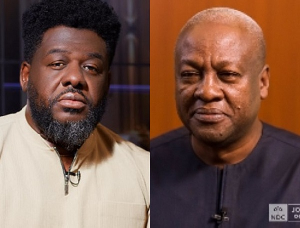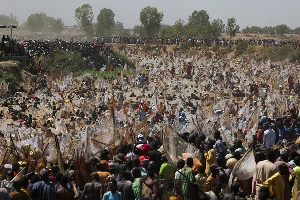Hon Mahama Ayariga, MP for the Bawku Central Constituency, has discounted any possibility of the Representative of the People`s Amendment Act (ROPAA) being used for the 2008 elections, considering the existing structures and some modalities well instituted. He was speaking on the theme, "Implementing the Representation of the Peoples (Amendment) Act, 2006: ROPAA, which way to go: A Critical Analysis from a Governance Perspective" at a seminar held in Accra.
Hon Ayariga said some issues which support his assertion on why this amendment will be difficult to implement are issues of residency and the Electoral Commission`s strength to enhance a successful process.
Responding to the issue of residency, Ayariga noted that since every Ghanaian resident in Ghana would naturally be resident in a polling division, it meant that all citizens who were resident in Ghana had an opportunity to be registered to vote in that polling division.
He added that by the new amendment, even if an individual is not resident in Ghana, that individual could still be registered as a voter once that individual hails from a constituency in which registration was done.
"Residency in a polling division in a constituency was central to the qualification of an individual to register and vote in that constituency"
Ayariga questioned the strength of the Electoral Commission and wondered whether it had what it takes to undertake a successful process, especially when the amendment has sought to extend the facility exclusively for a small category of Ghanaian residents outside Ghana, talking only of citizens employed in posts outside Ghana in the service of the Republic of Ghana or the United Nations.
He queried how a facility exclusively meant for a small category of people could be extended to all Ghanaians citizens resident outside Ghana.
Ayariga, however, argued that the nation shouldn`t copy blindly the footsteps of some developed democracies that have arrangements that facilitate non-resident citizen voting as the specific design of an electoral system is context related.
He maintained that the notion that the amendment could attract foreign investment from Ghanaians resident abroad could not be more displaced, as that could also to mean that foreigners bringing down foreign investment could also be registered and allowed to vote.
Mr. Kwame Gyan, lecturer at the faculty of Law, University of Ghana, said the Representative of Peoples Amendment Act (ROPAA) could only be extended to people classified as refugees or internally displaced persons.
He maintained that these are individuals who had found themselves at such places not for their doings but as a result of wars, political asylum, famines and for whom the United Nations humanitarian law create a platform where these can contribute to their states, irrespective of where they are at a point in time.
Mr. Gyan, however, didn`t hold any brief for Ghanaians who are resident abroad on the basis of economic desires, with excuses that they remit huge sums of monies into the economy. To him, the argument is vain.
He maintained that there couldn`t be any cogent point in that argument as some developing states receive huge remittances from citizens resident abroad, yet they ensure they return to their countries to vote in elections, citing the Philippines as one of many examples.
General News of Tuesday, 24 July 2007
Source: KELVIN ADU-TWUM for GYE NYAME CONCORD












